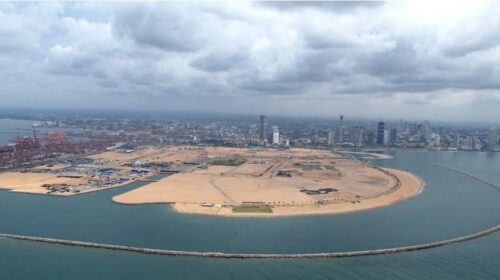India’s geopolitical concerns over Port City Colombo
View(s): 611
 India’s concerns over the Colombo Port City Project discouraging its business community from investing here is likely due to geopolitical issues and a lack of awareness of the regulations that are still being finalised, Sri Lankan authorities state.
India’s concerns over the Colombo Port City Project discouraging its business community from investing here is likely due to geopolitical issues and a lack of awareness of the regulations that are still being finalised, Sri Lankan authorities state.
A recent report in the Indian media said there are concerns expressed over the Colombo Port City Project citing it’s a possible “hub for money laundering and extra- legal activities,” extended tax holidays, the Chinese involvement and as a result of which any Indian investors will “essentially be on their own”.
These concerns had reportedly been raised at a high level inter-ministerial meeting chaired by India’s Deputy National Security Advisor Vikram Misri on July1.
For quite a long time India has been wary” about the Colombo Port City Project “but her companies have been interested in it due to its proximity to the subcontinent’s gateway port, the Port of Colombo,” the Port City Colombo Economic Commission Member and spokesperson Saliya Wickramasuriya told the Business Times.
He pointed out that “many who offer views are not familiar with the structure of the Port City Project or the Act that defines it,” and thinks it is most likely due to popular theories surrounding China’s involvement. The CHEC Port City Colombo through China Harbour Engineering Company (CHEC) is the sole investor in the project, for which Sri Lanka has not borrowed any money. The CHEC Port City company takes all the market risk in the event of failure of the project to meet its objectives, with no liability put on Sri Lanka.
The Regulations under the CPCEC 2021 Act are currently being finalised, and these will govern all aspects of investments into the project. These cover a wide range of areas such as banking and finance, insurance, investment agreements, business setting up, community and labour rules, Mr. Wickramasuriya said.
When asked about the allegations of money laundering coming from various actors, he pointed out that the Port City Commission “cannot issue its own banking licenses” but can only make recommendations to the Monetary Board, and these too only supporting applications from already licensed banks to establish branches.
“In this respect, all responsibility for Know Your Customer (KYC) norms, Anti Money Laundering (AML) Standards and Combating of Financing of Terrorism(CFT) rests entirely with the banks. The Port City Economic Commission will maintain a Financial Regulatory Committee to oversee the banking operations within the Area of Authority”, he said.
“Perhaps some people may feel it is a threat to their commercial or security interests, but they will not feel threatened when they see the regulations,” he explained.
India is not the first country to express concern in fact the US had also stated their reservations on the possibility of the location serving as an outpost for money laundering.
“Those might have seemed valid questions to them at that time” Mr. Wickramasuriya said, but added that all such concerns will be adequately addressed when the relevant regulations are promulgated, and that Sri Lanka was careful to preserve the ability to attract quality investments.
“We are simply going to let our regulations speak for themselves,” he noted, adding that the Port City Project is just a city behind a port, not actually containing one, and that there are many such misunderstandings surrounding that which have been repeatedly clarified, to the point that the Commission does not respond to each and every article published due to their varying levels of accuracy. “If a foreign mission makes formal representations about the project to the Commission, we will receive these very openly. However, there have been none to date.”
Earlier this year the commission facilitated a tour for senior Indian journalists organised by the CHEC Port City company, following which Mr. Wickramasuriya believes “they commercially de-risked” it for Indian investors, and “cast a positive light on the project to counter various popular but false narratives regarding ownership and control”. He clarified that the Port City project is entirely governed by the laws of Sri Lanka and is not a foreign jurisdiction. The CPECEC Act simply allows for exemptions from certain Sri Lankan statutes that pertain to investment management, services and residence by regulations drafted under it, he noted. At present there has been interests expressed by possible investors from countries like Australia, UK, US, Canada, India and Hong Kong. So far six of the 74 blocks have been leased by the local Browns Group together with international investors, and two more investments are said to be close to finalising from the UK and the US, Mr. Wickramasuriya said.
Meanwhile the Sunday Times reported last week that the Central Bank has authorised a special class of bank account called the Colombo Port City Investment Account (CPCIA) exclusively to carry out business at the Port City.